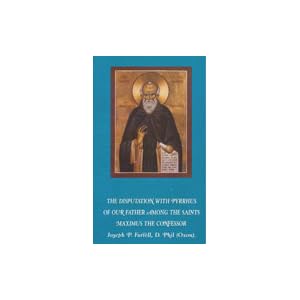Tuesday, January 31, 2012
Christ willed dually and not singly
The Disputation With Pyrrhus of Our Father Among the Saints Maximus the Confessor
7. Maximus: Yes, I truly do. For what is a more irreverent conception than that which maintains that the same person with the very same will, which before the Incarnation created everything from nothing and which maintains, provides, and orders everything for salvation, after the Incarnation desireth food and drink, changeth from one position to another, and performeth all manner of similar things that are free from blame and reproach, but which would by this means prove that the whole Economy of the Incarnation was not illusory?
8. Pyrrhus: But is Christ one or not?
9. Maximus: Yes, obviously He is one.
10. Pyrrhus: If Christ be one person, then He willed as one person. And if He willed as one person, then doubtless He hath one will, and not two.
11. Maximus: To state something and not first to distinquish the different meanings of what is being said invites confusion, and ensures that what is under investigation remains obscure, which is foreign to a man of learning. Therefore, explain this to me: If Christ be one, is He God only, or man only, or both together, God and man?
12. Pyrrhus: Obviously, God and man.
13. Maximus: Therefore, Christ existeth as God and as man by nature. Then did He will as God and as man, or only as Christ? If it were Christ who willed and initiated actions, being both God and man, then it is clear that, being one and the same, He willed dually and not singly. For if Christ be nothing else apart from the natures from which and in which He existeth, then obviously He willeth and operateth in a manner corresponding to each of his natures, in other words, as each nature is capable of operating. And if He hath two natures, then He surely must have two natural wills, the wills and essential operations being equal in number to the natures. For just as the number of natures of the one and the same Christ, correctly understood and explained, doth not divide Christ but rather preserveth the distinction of natures in the union, so likewise the number of essential attributes, wills, and operations attached to those two natures doth not divide Christ either. For throughout both of His natures there flowed the same activity and purpose, to witm our salvation. This introduceth no division -- God forbid! --but rather shows that they are preserved unimpaired, in their entirety, even in the union.
pages 3-5 from the book "The Disputation With Pyrrhus Of Our Father Among The Saints Maximus The Confessor" Translated from the Greek by Joseph P. Farrell
Labels:
Books,
Christology,
jnorm
Subscribe to:
Post Comments (Atom)
Links
FUNDAMENTAL LINKS
POPULAR POSTS
-
Audio Confronting the Doctrine of Sola Scriptura , by Fr. Jon Braun. (This one is mostly about what some Protestants call Solo Scriptura , o...
-
I am Augustine, thy Father: Thou shalt have no other Fathers before me .
-
St. Polycarp of Smyrna was a disciple of St. John the Apostle and a friend of both Sts. Papias of Hierapolis and Ignatius of Antioch, who we...
-
From the book The Person in the Orthodox Tradition by Metropolitan of Nafpaktos Hierotheos, and translated by Esther Williams "...
-
How Protestants would name the first five books of the New Testament , if they would be truly faithful & fully honest to their anti-trad...
TOPICS
- A Biblical Defence of Orthodoxy (13)
- A Defense of the Holy Icons (10)
- Abortion (3)
- About Us (14)
- Absolute Divine Simplicity (2)
- Addiction - Idolatry - Spiritual Struggle (37)
- Apocrypha (4)
- apologetics (3)
- Apophatic Theology (1)
- Articles (6)
- Asceticism (1)
- Atheism (10)
- Atonement (23)
- Audio (6)
- Books (19)
- Calvinism (51)
- Canon of Scripture (8)
- Christmas Carols (4)
- Christology (28)
- Church Calendar (104)
- Church Fathers (66)
- Church History (26)
- Cyrillian Chalcedonianism (1)
- David (4)
- Debates (8)
- Double Standard (40)
- Eastern Orthodoxy NOT Refuted (6)
- Ecclesiology (5)
- Eschatology (6)
- Essence and Energies (2)
- Eucharist (10)
- Exegesis (18)
- Fasting (80)
- Fathers and Sola Scriptura (13)
- Fathers on Free Will (6)
- Fathers on the Eucharist (3)
- Feminism (6)
- Filoque (1)
- Hell (9)
- Heretical Christology (4)
- Heretical Triadology (1)
- Holy Spirit (1)
- Homosexuality (2)
- hypostasis (7)
- Icons (19)
- Is Eastern Orthodoxy Christian? (2)
- Islam (13)
- Jehovah's Witnesses (6)
- jnorm (12)
- Judaism (14)
- Justification (19)
- Kabane52 (8)
- Lvka (197)
- Martyrdom (17)
- Mary (8)
- Miscellaneous (131)
- Monothelitism (1)
- Morality (33)
- Mormonism (1)
- Myths (3)
- Old Calendarism (3)
- Original Sin (2)
- Orthodox (9)
- Pages (9)
- Patristics (1)
- Philosophy and Politics (12)
- Prayer (11)
- Prayers to the Saints (2)
- Predestination (5)
- Prosperity Gospel (4)
- Protestantism (206)
- quotes (1)
- Rebuttals (10)
- Relics (1)
- Resources (28)
- Roman Catholicism (20)
- Romans (3)
- Romans Chapter 9 (5)
- Sacraments (19)
- Schismatics (4)
- Scripture (2)
- Sola Fidea (1)
- Sola Scriptura (25)
- Soteriology (1)
- Theotokos (3)
- Tradition (8)
- Triadology (8)
- Video Resources (14)
- Videos (30)






0 comments: